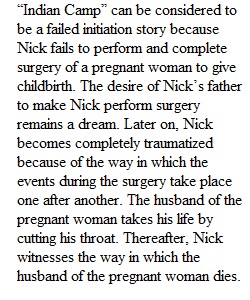


Q Select any two of the following questions and create two critical, thoughtful responses. When crafting your responses, be sure to note the title of the pieces you’re discussing. Use in-text citations from the readings to support your point of view. 1. In what ways is “Indian Camp” a failed initiation story? What exactly is Nick’s father trying to teach his son by taking him to the Indian Camp? How successful is he? 2. Nick’s father says, “But her screams are not important. I don’t hear them because they are not important.” Does the story imply that they might be important on some level? Why does the Indian kill himself? 3. How does Hemingway dramatize the idea of “grace under pressure” in “The Short Happy Life of Francis Macomber”? 4. Does Mrs. Macomber deliberately murder her husband, or does she shoot him accidentally while she is aiming at the buffalo? What does your answer to the preceding question reveal about Mrs. Macomber’s character—and, by extension, human behavior? 5. How does Hemingway suggest the psychological consequences of war on Harold Krebs in “Soldier’s Home”? Considering Hemingway’s depiction of Krebs and looking carefully at the story’s ending, what do you think will become of Krebs? 6. Find and explicate a key passage in “Soldier’s Home” that most aptly expresses Krebs’s state of mind as he is re-encountering the norms of conventional peacetime life in America. 7. What does Krebs actually want in this story? How does Hemingway suggest Krebs’s problems in adjusting to the ordinary routines and expectations of post-war life? 8. Describe the different attitudes expressed by the young waiter and the old waiter. Which one do you identify with or feel more sympathy for? 9. Describe the philosophy of life that the old waiter develops over the course of “A Clean, Well-Lighted Place”? Is he able to bring any sort of meaning, value, or order to the darkness and uncertainty that seems to pervade this narrative? 10. In “Fifty Grand,” Jack Brennan bets against himself in his match against Walcott and deliberately loses the bout to collect $50,000. Does Brennan exhibit enough “grace under pressure” to gain your admiration? 11. What is the “something” that is “ending” in “The End of Something,” and why, exactly, do you think, given the details in the story, that it is coming to an end? 12. What are the implications of Bill’s arrival at the end of the story? And which character provides the finest exhibition of “grace under pressure” in the story? 13. Compare and contrast the hotel-keeper and George. Consider in particular how well the hotel-keeper is doing his job running the hotel and how well George is fulfilling his role as a husband. 14. What kinds of feelings and desires is the wife “really” expressing toward the end of the story? How is this story an account of a failed communication? 15. Why do you think Hemingway chose to present this particular love triangle in “The Sea Change”? Describe the love triangle and comment on why you believe Hemingway designed the narrative to allow the specific details of the affair to emerge indirectly through the characters’ dialogue over the course of the story? Make your initial posts by 11:59 p.m. U.S. EST/EDT on Day 4 of Unit 4. Then, review your classmates’ posts and respond to at least three of them. Make your final posts by 11:59 p.m. U.S. EST/EDT on Day 7 of this unit.
View Related Questions